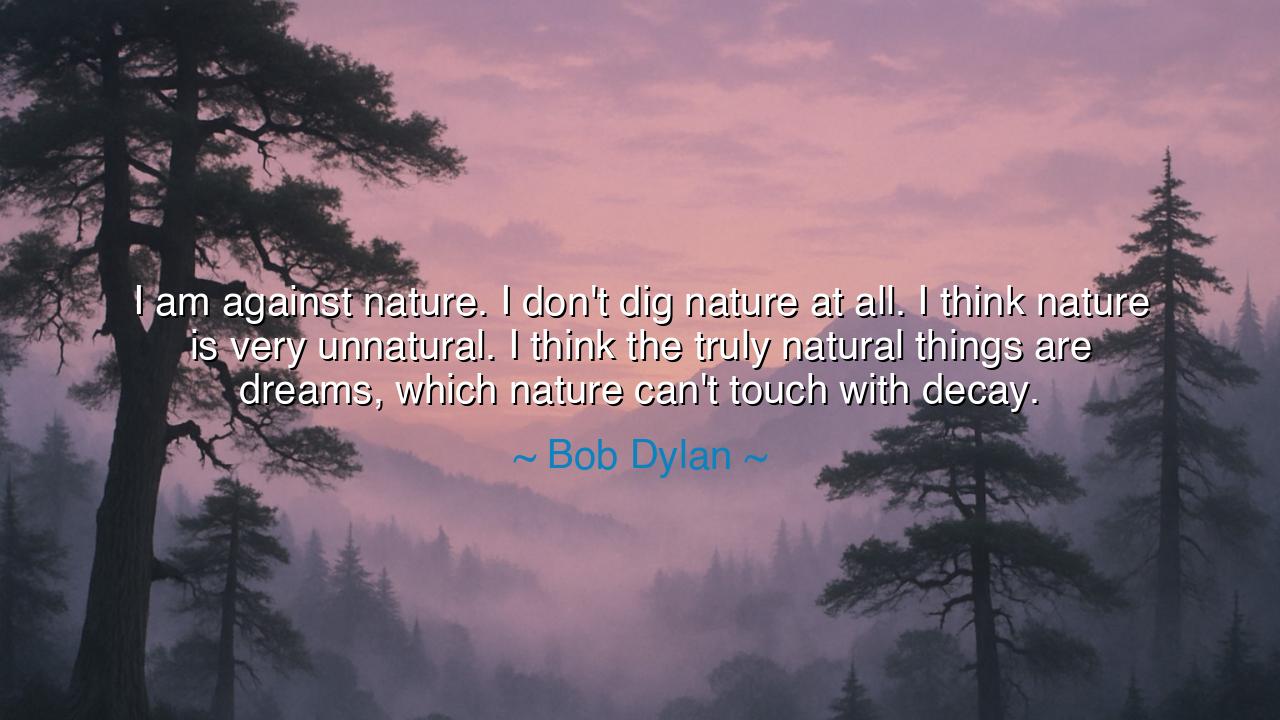
I am against nature. I don't dig nature at all. I think nature is
I am against nature. I don't dig nature at all. I think nature is very unnatural. I think the truly natural things are dreams, which nature can't touch with decay.






The Immortality of the Dream
In the strange and luminous words of Bob Dylan, troubadour of the modern age, we find this paradoxical confession: “I am against nature. I don’t dig nature at all. I think nature is very unnatural. I think the truly natural things are dreams, which nature can’t touch with decay.” At first, these words seem to rebel against the world itself—the rivers, the trees, the earth that birthed us. But beneath Dylan’s rebellion burns a profound truth. For he is not denying the beauty of the world; he is declaring that the eternal lies not in what perishes, but in what endures beyond decay. He sees that all forms born of nature wither and pass away, but dreams, the creations of the spirit, possess a divinity untouched by time.
The meaning of this quote lies in Dylan’s defiance of the transient. Nature, he says, is “unnatural,” not because it is false, but because it is fleeting. Everything in it—every flower, every body, every breath—is destined for dissolution. The cycle of decay is the law of the earth. Yet Dylan, being a poet, a dreamer, refuses to yield his soul to that impermanence. He claims for humanity a higher nature—the realm of dreams, of imagination, of song and vision. For in dreams, there is creation without decay, a world that death cannot enter. To him, the dream is the truest expression of life, because it comes from within and transcends the dust from which we rise.
The origin of these words lies in the heart of Dylan’s restless philosophy. He was a man who walked through the revolutions of his age, seeing both the glory and corruption of the world. Where others saw progress or despair, he saw illusion. He knew that everything external—power, fame, even nature itself—was impermanent. But in the inner vision of the dreamer, he found immortality. Thus, when Dylan said he was “against nature,” he was rejecting the tyranny of time, the law of decay that governs all things that are born. His rebellion was not against the earth, but against death—the slow fading that claims all that is physical. In dreams, he saw freedom; in the imagination, eternity.
This truth, though veiled in poetry, is as old as the ancients. Plato once taught that the visible world is but a shadow of a higher reality—the realm of ideals, where beauty and truth are perfect and everlasting. What Dylan calls “dreams,” Plato called “Forms.” Both speak of the same mystery: that beyond the crumbling face of matter lies a dimension untouched by decay. And when an artist dreams, he glimpses that higher realm. Michelangelo saw the angel within the marble before he set chisel to stone; his dream was already eternal, even before his hands made it visible. The statue may erode, but the vision—the dream—remains immortal.
There is a story told of Keats, another poet who, like Dylan, wrestled with mortality. As death approached, Keats wrote that he felt “half in love with easeful Death,” but even then he turned to poetry—to the dream—as his refuge. He knew his body would perish, but his words, born of imagination, would not. And so it was: centuries later, his dream still breathes through the lines of Ode to a Nightingale. The bird that sang in the dark has long since turned to dust, but the dream it inspired remains eternal. Dreams cannot decay, for they are woven of the spirit, not of the soil.
Dylan’s statement, then, is not nihilism—it is defiance through creation. He calls upon us to live not merely as creatures of nature, bound by birth and death, but as creators, whose inner worlds can shape eternity. To dream is to rebel against entropy; to imagine is to claim immortality. The dreamer refuses to accept that the story ends with death. He writes, paints, sings, or loves with such intensity that even when his flesh fades, his vision remains—a light carried forward by others who see it and believe.
Thus, the lesson of this quote is this: Do not worship the temporary. The flowers will fall, the mountains will erode, even the stars will die—but the dream, the creation of the awakened soul, endures. Nurture your inner vision, for it is more real than the world you see. Cultivate imagination as the ancients cultivated the flame, for through it, man partakes in the eternal. Build not only with your hands, but with your heart. Dream fiercely, create bravely, and your spirit shall live beyond the decay of all things.
And when the earth reclaims your body, your dreams will still walk the world—like invisible constellations guiding the hearts of those yet to come. For as Dylan declared, nature cannot touch the dream. It is the one creation that belongs not to time, but to eternity.






AAdministratorAdministrator
Welcome, honored guests. Please leave a comment, we will respond soon